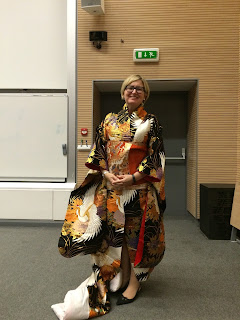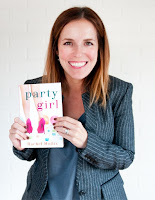Pure fiction, but inspired by my Mum, and the Crossthwaite Church.
~~~~~~~~~~~~~~~~~~~~~
The Crossdale Church
The black iron hinges in the great old door didn't creak, to Catherine's surprise. The church door swung open noiselessly, swapping the spring-tasting freshness of the churchyard for cold, musty air. She stepped inside and closed the door again, waiting for her eyes to adjust to the dimness.
She was conscious that she didn't want to look, didn't want to be disappointed. She kept her eyes averted from the nave and the chancel, taking in the backs of old, oak pews, and scattered red rugs on the smooth-worn stone floors, while her stomach curled in nerves and uncertainty.
"Well," she said, "I'm here."
"That's a fact."
The soft voice made her jump. She saw a smaller door in the opposite wall, through which soft light and a sturdy figure were emerging. It was an older woman, short and mostly shapeless, with hair cut short and no make up.
"I'm sorry," Catherine said. "I didn't know someone was here. I don't mean to interrupt–"
But the other woman did. "Here to look around? Just help yourself, chick, don't mind me." As she gestured, Catherine saw she held a bunch of carnations in one hand, and a pair of secateurs in the other.
Catherine nodded. "Thank you," she said, and turned to the aisle.
Except now that she was here, for Mum, she didn't really want to do the things Mum would have done. Didn't want to read through the history leaflet and guide to the church, study the stained-glass, examine the font. Unsure, she went and sat in one of the pews, looking without seeing. She breathed deep of the cold air, and this time she realised the mustiness had faded, and she could smell furniture polish and more exotic blooms than the bulbs outside.
It was chilly, but it was calm.
Nothing in the last few weeks had been calm. Mum's funeral had been a matter of endless letters and phone calls and arrangements, of synthetic carpet and strip lighting and plastic chairs. And, in spite of it all, the strong, binding thread of a whole community of people who had thought the world of Catherine's Mum, and shared her grief.
But it hadn't been calm.
Her gaze focussed on the big glowing window behind the altar. A solemn figure in russet and white stood there, staring down. His eyes seemed to know everything, but communicate nothing.
"Are you alright?"
It was the flower woman, easing down into the pew next to her with a little grunt of effort. In the quietness of the Crossdale Church, Catherine found she wanted to explain. "My... my Mum died recently."
"Ah." The syllable was warm with no-nonsense sympathy, the sort that would hand over a cup of tea and tissues, and refrain from mouthing pointless words.
"There was this... this sort of running joke in the family," Catherine went on, "that each time we came here on holiday – most of our childhood holidays were here, you see – that Mum never got a chance to visit the Crossdale Church." Catherine gestured at the serene beauty around them, still-life in stone, then clutched her hands in her lap again. "It was just the sort of thing she loved to do, poking around in old churches. Even when Dad died, she would still come here, but she never visited the church. She said once that she liked to leave something undone for next time, so that she'd never done it all, so that there was always something to look forward to."
The woman had turned slightly on the pew, watching her. Catherine closed her eyes for the moment, swallowing against the tightness in her throat. "Only.... she never had the chance to... " She gave up.
The woman slid her hand over and gripped Catherine's. It was a broad, short-nailed hand, and Catherine could feel the calluses on the palm and fingers. The distant chattering of swallows filtered through the windows.
"So I thought I'd come and do it for her," she continued eventually. "I thought... it would be a... a chance to think, to do something in her memory. But now I'm not sure. Was that the right thing to do? Did Mum mean for it to be a... an eternally uncompleted thing?"
"It's big questions you have, there," the woman said, mildly. "Bigger, I think, than a church. And a mother."
Catherine sagged. "Yes."

The woman took back her hand and settled a little more, folding her arms, tipping her head up as if examining the vaults of the soaring ceiling. "So what are the real questions, I'm wondering?"
It was St Peter in the window, Catherine realised. She could see the key in his hand. "Should we always complete everything? Are there some things that are better left as... as a potential than a real thing? Are there things that are best just as they are without being pursued? Should we leave things undone, or try and get... resolution to everything?"
"Unfinished business."
"Yes."
The woman shrugged. "Everyone has some. Don't you?"
Catherine nodded. "Oh yes. And I'm almost sure I know what to do about that, but... What about you? Do you have unfinished business anywhere?"
She gave Catherine a wry look. "With sixty and more years in my dish, it would be a wonderful thing if I hadn't. But yes."
The pause stretched out too long, and Catherine gathered herself, meaning to go. "Well, thank you for listening to me, I–"
"His name was Michael Maguire."
Catherine said nothing.
"I didn't marry him. I married the other one, but I knew Michael would have liked fine to be the one. He was a teacher, in the other valley. And my husband a farmer in this. And then my husband died, and the bairn with him."
It was Catherine's turn to reach for the other woman's hand, clutching it tightly. The woman smiled and patted the back of Catherine's hand with her free one. "It was a long time ago, chick. They went swimming. It was a lovely day. But then there I was, a widow and a farm to run, all broken inside, and even knowing that Michael was fond of me, even not seeing him, felt like some kind of evil insult. I sent him packing. Then, a couple of years later, I lifted my head and felt like I saw the horizon for the first time. But then he'd upped and married. She was a good girl, and good for him."
"But you wonder... what if?" Catherine prompted.
"Ah, no. I don't wonder or what-if my life, chick. But Michael's wife's been dead these five years and I... never re-married. So his phone number's been burning a hole in my head a while now."
"What are you going to do?"
The woman grimaced. "Well, how about you tell me what you think. About unfinished business, your Mum, and the Crossdale Church?"
"I think..." Catherine breathed in the polish and the flowers, the stone and the peaceful centuries. "I think Mum was crazy. It's beautiful here, and she missed that. And if she had crossed the Crossdale Church off her list, there would always be something else beautiful and real and possible around the corner."
"So unfinished business?" prompted the woman.
Catherine spoke with certainty. "Should be finished or crossed off. But not left unfinished as some sort of protection against finishing a life. Life isn't finished when you've done everything or loved everyone or been down every road, because life isn't a competition or an itinerary. It's a dance." She turned to face the woman, looking into the pale eyes, seeing an outdoor life stamped on her unashamed skin. "And sometimes in the dance you separate. And sometimes you join hands again."
The other woman's lips pursed. It wasn't quite a smile. She set her callused hands on her knees. "Well, I have these flowers to finish."
"May I help?"
"Surely."
Catherine set out arrangements and vases, and they talked. Not philosophy, not this time. This time they talked about lily pollen and gladioli, about ultrasound scanning of ewes and over-grazing. It was a perfect blessing not to be talking about casket wreaths and whether anyone had asked Uncle John to contribute to the eulogy.
"There," the woman said, wiping her hands. "I'll finish up here. Get you gone, chick."
Catherine smiled at her. "I–"
"Shoo," she said, flapping her hands.
"Alright, alright," Catherine said, laughing. "Thank you."
The woman slipped into the vestry. There had been merry hell when the vicar insisted on having a phone line put in, but now she picked it up and dialled without hesitation. "Michael," she said, when he picked up. "Yes. It's me." She looked up at the notice board, unusually lost for words. A snippet of a quote caught her eye, scrawled in the vicar's left-handed writing on a scrap of pale blue paper, skewered with a scarlet-tipped pin. It was something of Christina Rossetti's.
Can anything be sadder than work left unfinished? Yes, work never begun."Michael?" she said. "We have unfinished business."
It was warm in the sunshine. Catherine filled her lungs with the narcissi-scented air and thumbed her phone on, waiting for it to connect to the real world. She opened her contacts and scrolled through, searching for.... there. Scott Benton. Her finger hovered over the entry for a moment, then she smiled. And pressed delete.
On the stone wall a thrush flicked its tail at her, then leaped into flight, singing its joy at the bright sky.









